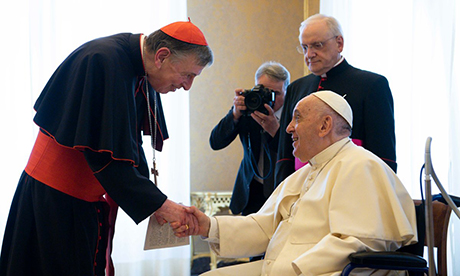Doing nothing to overcome the divisions among Christians means allowing tensions to fester and even feed conflict, Pope Francis said.
During a meeting on 6 May with members of the Pontifical Council for Promoting Christian Unity, Pope Francis said “Ignoring the divisions among Christians, whether out of habit or out of resignation, means tolerating that pollution of hearts which makes fertile ground for conflict.”
While the COVID-19 pandemic forced many ecumenical initiatives to be cancelled or moved online, he said.
It also had the benefit of creating a “renewed awareness” among Christians that they belong to one family, an awareness “rooted in the experience of sharing the same fragility and of being able to count only on God’s help.”
He said the pandemic proved the wisdom of 50 years of ecumenical work emphasising that “for a Christian it is not possible, it is not viable, to go it alone within one’s confession.
Either we go together, fraternally, or we do not walk.”
But, he said, even before the pandemic was truly over, “the entire world was faced with a tragic new challenge — the war currently underway in Ukraine.”
The war in Ukraine, he said, “cannot fail to question the conscience of every Christian and every church.”
“We must ask ourselves: What have the churches done and what can they do to contribute to the ‘development of a global community of fraternity based on the practice of social friendship,’” he said, quoting from his encyclical, “Fratelli Tutti.”
“Today, in the face of the barbarity of war, this longing for unity must again be nourished,” Pope Francis said.
The Christian mission to proclaim “the Gospel of peace, that Gospel that disarms hearts even before armies,” he said
“Will be more credible only if it is proclaimed by Christians who are finally reconciled in Jesus, the prince of peace,” and who are “animated by his message of universal love and brotherhood.”
Pope Francis also provided encouragement to council members in their efforts to plan the 2025 ecumenical celebration of the 1,700th anniversary of the First Ecumenical Council of Nicaea, “an event of reconciliation,” which formulated the creed and settled basic questions about Christ’s identity.
Pope Francis also reminded council members at their national bishops’ conferences that in preparing for the Synod of Bishops in 2023, they should “look for ways to listen also to the voices of brothers and sisters of other confessions on issues that challenge faith and ‘diakonia’ (Christian service) in today’s world.”
“If we really want to listen to the voice of the Spirit, we cannot fail to hear what he has said and is saying to all those who are born again ‘of water and of the Spirit,’” the pope said.
Sources
Additional readingNews category: World.




